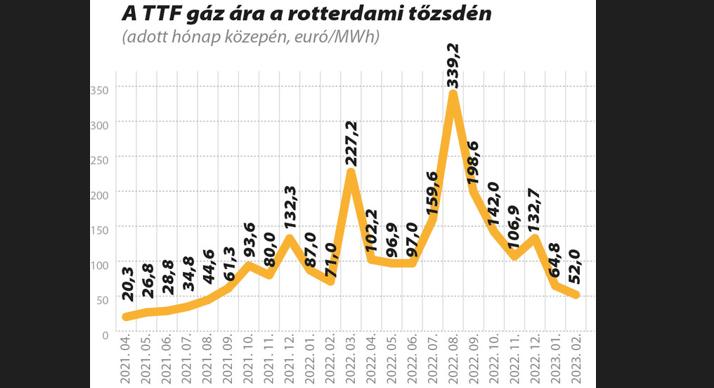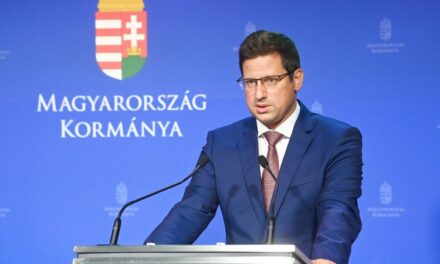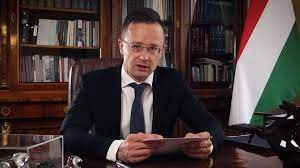With the end of the panic related to winter, gas prices on the international markets have been falling significantly since January, which may have played a role in the fact that the minister announced that the price of household energy carriers will not change this year. With the reduced utility tariff, the central budget left families with an average of HUF 181,000 per month this winter. If the decrease in the price of gas remains permanent, the government may even decide to reduce the retail market price in the spring, although in the autumn months the scarcity of stocks is expected to push the stock market gas prices up again.(...)
52 percent of the energy used by Hungarian households for heating is gas, which means that the evolution of the price of gas mostly determines the population's energy expenditure. On the Rotterdam Stock Exchange, which is the main platform for gas trading, the outbreak of the Russian-Ukrainian war significantly raised the price of the energy carrier, and then the new Brussels sanctions further pushed the price level up. Thus, from the typical 15-20 euros until the summer of 2021, the so-called TTF gas rate climbed to the level of 90 euros by the end of 2021 with the escalation of Russian-Ukrainian tensions, then at the outbreak of the war it jumped above 200 and stabilized around 100 euros, then in the autumn panic, when it was already a question was, will there even be enough gas in Europe until the end of the heating season due to the sanctions, it reached 200-300 euros.
As a result of the mild winter, the reduction in consumption and the calmness associated with them, the price fell rapidly in the last two months: compared to 132 euros in mid-December, the TTF was listed for only 65 euros in mid-January, and nowadays it is just a hair below 50 euros. This is an extraordinary drop in prices, but it is still three times higher than the level before the outbreak of the war. We can also put it this way, when the pre-war tension had not yet appeared in energy prices. (As a point of interest: the coronavirus and the subsequent industrial downturns did not particularly affect the price of gas, it was between 15 and 20 euros even in the years before the virus appeared.)
The favorable movement of the stock market price therefore created a good opportunity for the government to announce the maintenance of the reduced utility price level in the next heating season as well. Even if, in fact, the price of residential gas is not determined directly by the stock market, but by the fifteen-year secret gas purchase contract signed with Russia a year and a half ago - the latter, however, certainly has its provisions referring to market conditions. In this year's budget, the government planned HUF 2,610 billion for the so-called overhead protection fund, which is provided by special tax payments from sectors that achieve extra profit, i.e. 95 percent of the profits of banks, insurance companies, energy companies, telecommunications companies, airlines and, since December, Mol, achieved on gasoline prices, which alone It swells the budget by HUF 500 billion. Looking at the current prices on the world market, the utility protection fund can certainly cover the energy price subsidies for the population, municipalities and small businesses, since during this winter the compensation for the two or three times higher price level did not derail the budget either.
the entire article of the Democrat here.
Author: Sándor Szarka
Image: Democrat













